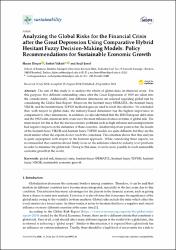| dc.contributor.author | Dinçer, Hasan | |
| dc.contributor.author | Yüksel, Serhat | |
| dc.contributor.author | Şenel, Seçil | |
| dc.date.accessioned | 10.07.201910:49:13 | |
| dc.date.accessioned | 2019-07-10T19:50:13Z | |
| dc.date.available | 10.07.201910:49:13 | |
| dc.date.available | 2019-07-10T19:50:13Z | |
| dc.date.issued | 2018 | en_US |
| dc.identifier.citation | Dinçer, H., Yüksel, S. ve Şenel, S. (2018). Analyzing the global risks for the financial crisis after the great depression using comparative hybrid hesitant fuzzy decision-making models: Policy recommendations for sustainable economic growth. Sustainability, 10(9). https://dx.doi.org/10.3390/su10093126 | en_US |
| dc.identifier.issn | 2071-1050 | |
| dc.identifier.uri | https://dx.doi.org/10.3390/su10093126 | |
| dc.identifier.uri | https://hdl.handle.net/20.500.12511/1920 | |
| dc.description | WOS: 000446770200169 | en_US |
| dc.description.abstract | The aim of this study is to analyze the effects of global risks on financial crises. For this purpose, five different outstanding crises after the Great Depression of 1929 are taken into the consideration. Additionally, four different dimensions are selected regarding global risk by considering the Global Risk Report. Moreover, the hesitant fuzzy DEMATEL, the hesitant fuzzy VIKOR, and the hesitant fuzzy TOPSIS methodologies are used to reach this objective. We concluded that, with respect to global risks, the industry-based dimension has the highest importance in comparison to other dimensions. In addition, we also identified that the 2010 European debt crisis and the 1982 Latin American debt crisis were the most influenced crises in terms of global risk. The main reason for this is that the macroeconomic problems such as high inflation and unemployment had negative impacts on the industries of these countries. Another important point is that the results of the hesitant fuzzy VIKOR and hesitant fuzzy TOPSIS models are quite different, but they are the most similar when the experts do not reach the consensus. This situation shows that this analysis is quite appropriate with respect to the hesitant approach. While considering these aspects, we recommended that countries should firstly focus on the solutions related to industry level problems in order to minimize the global risk. Owing to this issue, it can be more possible to reach sustainable economic growth in the world. | en_US |
| dc.language.iso | eng | en_US |
| dc.publisher | MDPI | en_US |
| dc.rights | info:eu-repo/semantics/openAccess | en_US |
| dc.rights | Attribution 4.0 International | * |
| dc.rights.uri | https://creativecommons.org/licenses/by/4.0/ | * |
| dc.subject | Global Risk | en_US |
| dc.subject | Financial Crisis | en_US |
| dc.subject | Hesitant Fuzzy DEMATEL | en_US |
| dc.subject | Hesitant Fuzzy TOPSIS | en_US |
| dc.subject | Hesitant Fuzzy VIKOR | en_US |
| dc.subject | Sustainable Economic Growth | en_US |
| dc.title | Analyzing the global risks for the financial crisis after the great depression using comparative hybrid hesitant fuzzy decision-making models: Policy recommendations for sustainable economic growth | en_US |
| dc.type | article | en_US |
| dc.relation.ispartof | Sustainability | en_US |
| dc.department | İstanbul Medipol Üniversitesi, İşletme ve Yönetim Bilimleri Fakültesi, Uluslararası Ticaret ve Finansman Bölümü | en_US |
| dc.department | İstanbul Medipol Üniversitesi, İşletme ve Yönetim Bilimleri Fakültesi, Uluslararası Lojistik Yönetimi Bölümü | en_US |
| dc.authorid | 0000-0002-8072-031X | en_US |
| dc.authorid | 0000-0002-9858-1266 | en_US |
| dc.identifier.volume | 10 | en_US |
| dc.identifier.issue | 9 | en_US |
| dc.relation.publicationcategory | Makale - Uluslararası Hakemli Dergi - Kurum Öğretim Elemanı | en_US |
| dc.identifier.doi | 10.3390/su10093126 | en_US |
| dc.identifier.wosquality | Q2 | en_US |
| dc.identifier.scopusquality | Q2 | en_US |



















